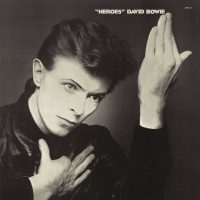 Written by: David Bowie
Written by: David Bowie
Recorded: July-August 1977
Producers: David Bowie, Tony Visconti
Released: 14 October 1977
Available on:
“Heroes”
All Saints
Moonage Daydream
Personnel
David Bowie: vocals, piano, synthesizer, tenor saxophoneBrian Eno: synthesizer
Carlos Alomar: guitar
George Murray: bass guitar
Dennis Davis: drums, percussion
Named after Kraftwerk’s Florian Schneider and the German V-2 rocket, ‘V-2 Schneider’ opened the second half of David Bowie’s “Heroes” album.
I like them as people very much, Florian in particular. Very dry. When I go to Düsseldorf they take me to cake shops, and we have huge pastries. They wear their suits. A bit like Gilbert and George, actually, God, whatever happened to those two? I used to really like them… When I came over to Europe – cause it was the first tour I ever did of Europe, the last time – I got myself a Mercedes to drive myself around in, cause I still wasn’t flying at that time, and Florian saw it… He said, “What a wonderful car”, and I said, “Yes, it used to belong to some Iranian prince, and he was assassinated and the car went on the market, and I got it for the tour.” And Florian said, “Ja, car always lasts longer.” With him it all has that edge. His whole cold emotion/warm emotion, I responded to that. Folk music of the factories.
Bowie met Kraftwerk when he played Düsseldorf’s Philipshalle on 8 April 1976, during the Isolar Tour. They met again at an after-show party in Paris on 17 May; the encounters were immortalised in Kraftwerk’s song ‘Trans-Europe Express’, which contains the lines “From station to station/Back to Düsseldorf City/Meet Iggy Pop and David Bowie”.
Much has been made of Kraftwerk’s influence on our Berlin albums. Most of it lazy analyses I believe. Kraftwerk’s approach to music had in itself little place in my scheme. Theirs was a controlled, robotic, extremely measured series of compositions, almost a parody of minimalism. One had the feeling that Florian and Ralf were completely in charge of their environment, and that their compositions were well prepared and honed before entering the studio. My work tended to expressionist mood pieces, the protagonist (myself) abandoning himself to the ‘zeitgeist’ (a popular word at the time), with little or no control over his life. The music was spontaneous for the most part and created in the studio.In substance too, we were poles apart. Kraftwerk’s percussion sound was produced electronically, rigid in tempo, unmoving. Ours was the mangled treatment of a powerfully emotive drummer, Dennis Davis. The tempo not only ‘moved’ but also was expressed in more than ‘human’ fashion. Kraftwerk supported that unyielding machine-like beat with all synthetic sound generating sources. We used an R&B band. Since ‘Station To Station’ the hybridization of R&B and electronics had been a goal of mine. Indeed according to a 70s’ interview with Brian Eno, this is what had drawn him to working with me.
Uncut, 1999


